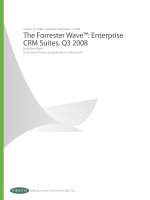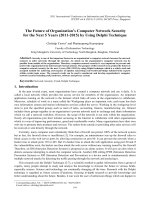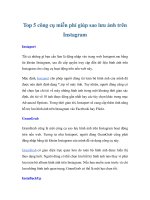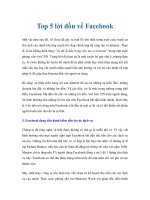The top 5 enterprise blockchain platforms
Bạn đang xem bản rút gọn của tài liệu. Xem và tải ngay bản đầy đủ của tài liệu tại đây (540.21 KB, 2 trang )
#1. Ethereum. Mature Smart Contracting Cross-Industry Platform
“Ethereum is a platform that makes it possible for any developer to write and distribute nextgeneration decentralized applications.”
Vitalik Buterin, Co-Founder, Ethereum
Founded by the 22 year old Russian-Canadian Vitalk Buterin, Ethereum is one of the most mature
blockchain platforms available today. Known for its robust smart contracting functionality and
flexibility, it is used widely across multiple industry use-cases. It has the largest number of use-cases
available today (50%+ in our sample set). Along with Hyperledger Fabric, Ethereum has developed a
large online support community as well has frequent product updates and enhancements.
The Ethereum Enterprise Alliance (EEA), a non-profit organization is now over 250+ members strong
and connects Fortune 500 enterprises, startups, academics, and technology vendors with Ethereum
subject matter experts. Despite its widespread adoption in enterprise use-cases, it’s important to
realize that Ethereum is essentially a permissionless (or public) platform that is designed for mass
consumption versus restricted access (typical requirement for privacy requirements in enterprise
use-cases). It is also PoW (proof-of-work) based which is not the fastest (resulting in potential
latency issues) and is an energy-sucker. Though it might change its consensus algorithm to the fast
PoS (proof-of-stake) in future versions.
#2. Hyperledger Fabric. B2B-focused Modular Blockchain Platform
“As new technology develops, there is a call for standards. Participants want to focus on time and
effort and investment to build solutions versus worrying about the framework. This is the rationale for
open standards…we are pulling together the most exciting portfolio with a multi-lateral developer
and vendor community. It’s similar to the benefits that Linux brought to the world of operating
systems.”
Brian Behlendorf, Executive Director, Hyperledger
Hyperledger, hosted by Linux Foundation and launched in 2016, is an open-source collaborative
effort to advance cross-industry blockchain technologies. One of its key goals is to create enterprisegrade distributed ledger frameworks and codebases. Hyperledger boasts 185+ collaborating
enterprises across finance, banking, Internet of Things, supply chain, manufacturing and technology.
Hyperledger Fabric is one of the 8 ongoing Hyperledger projects that was initially contributed by IBM
and Digital Asset. It is an attractive blockchain framework for enterprise solutions, given its modular
architecture, as it allows plug-and-play components around consensus and membership services. It
recently announced the release of Hyperledger Fabric 1.0 that claims to be production-ready for
enterprises.
#3. R3 Corda. New Operating System for Financial Services
“Corda has been developed to service the specific needs of financial services with generations of
disparate legacy financial technology platforms that struggle to interoperate, causing inefficiencies,
risk and spiraling costs.”
David E. Rutter, Founder and CEO, R3
Launched in 2015, R3 is a consortium of some of the world's biggest financial institutions that has
created an open-source distributed ledger platform called Corda. It’s partner network has grown to
60+ companies. While Corda was designed with banking in mind, other use cases in supply chain,
healthcare, trade finance, and government are emerging. There is no built-in token or cryptocurrency
for Corda, and it is a permissioned blockchain as it restricts access to data within an agreement to
only those explicitly entitled to it, rather than the entire network. Its consensus system takes into
account the reality of managing complex financial agreements. It is also known for its focus on
interoperability ease of integration with legacy systems.
#4. Ripple. Enterprise Blockchain Solution for Global Payments
"Global payments are undeniably going through a sea change, led by financial institutions adopting
blockchain to fix their customers’ broken payments experience. Now more than 100 financial
institutions are looking to Ripple as the solution to the problem…”
Brad Garlinghouse, CEO of Ripple
Ripple was founded in 2012 and was renamed fromOpencoin in 2015. It aims to connect banks,
payment providers, digital asset exchanges and corporates through RippleNet, with nearly-free
global transactions without any chargebacks. It enables global payments through its digital asset
called “Ripples or XRP” that has become one of the most popular cryptocurrency just behind Bitcoin
and Ether. XRP is touted to be the faster and scalable than most other blockchains (4 seconds
payment settlement versus 1+ hour in Bitcoin with the ability to 1,500 transactions per second
compared to 3-6 for Bitcoin). It has 100+ customers with 75+ clients in various stages of commercial
deployment across three primary use cases namely: cross-border payments (xCurrent), minimizing
liquidity costs (xRapid), and to send payments across various networks (xVia).
#5. Quorum. Enterprise-focused Version of Etheruem
“J.P. Morgan has long used open source software and we are excited to have this opportunity to give
back to the community. Quorum is a collaborative effort and we look forward to partnering with
technologists around the world to advance the state of the art for distributed ledger technology.”
Lori Beer, CIO, J.P. Morgan Corporate and Investment Bank
Developed by J.P. Morgan leveraging Ethereum since 2015, Quorum is designed to handle usecases requiring high-speed and high-throughput processing of private transactions, with a
permissioned group of participants. It does not use the Proof of Work (PoW) consensus algorithm
but uses vote-based and other algorithms enabling it to process hundreds of transactions per
second, depending on how smart contracts and networks are configured. Quorum is designed to
develop and evolve alongside Ethereum. It only minimally modifies Ethereum’s core, thus Quorum is
able to incorporate the majority of Ethereum updates quickly and seamlessly. Just like Etherue,
Quorum is also open sourced, free to use in perpetuity and encourages experimentation.









